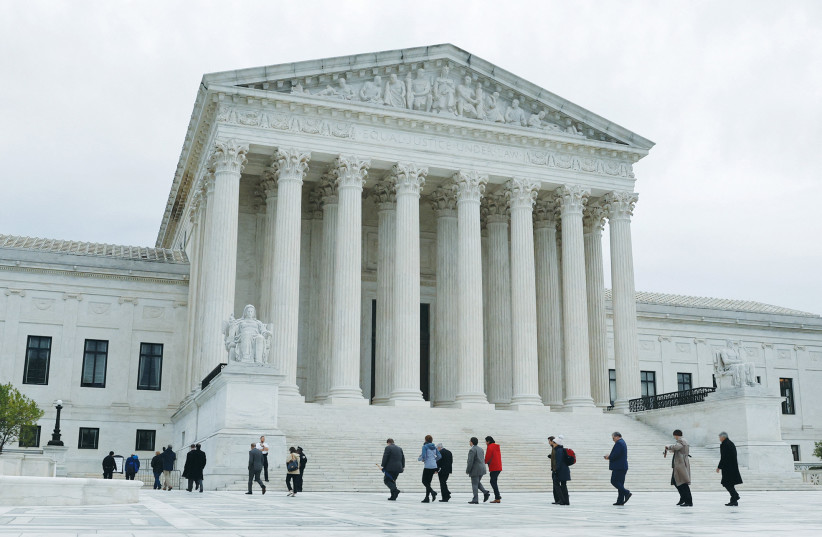Israel democracy, judicial review: The Brutus-Hamilton debate - opinion

Those opposing restoration of Knesset authority are forgetting not only Israeli history but American history as well.
The outcry that has greeted the move in the Knesset, Israel’s parliament, to restore the system of government instituted upon its founding in 1948, is astounding. Like Britain and New Zealand, the judiciary was not granted the power of judicial review, according to which the courts can nullify an act of parliament/Knesset. This was the system that governed Israel from its founding. But in 1992 the court influenced the justice minister to propose Knesset adoption of two Basic Laws: “Human Dignity” and “Freedom of Occupation.”
Upon adoption of these laws, the court announced that it was up to the court to define their content and that this content included the power of judicial review. Thus, judicial review in Israel was entirely a judicial creation. It enabled the court to rein in the Knesset. In short, the court was formulating a constitution.
These fundamental laws of constitutional character were adopted without even 61 members of the 120-member Knesset being present, let alone voting in favor of these laws (one was adopted by 32 Knesset members, the other by 23). This “ordinary vote” in the Knesset was instituting vast and radical changes in the country’s system of government in a clandestine manner at midnight and without any public notice. Is this democracy?
The court also assumed a novel power to declare Knesset laws unconstitutional for “unreasonableness,” a power unknown even to American courts. It was a brazen grab of power unmatched in any democracy. The court also nullified the standard requirement of standing, so that anyone could challenge a Knesset decision for any reason. Thus, compare the US Supreme Court that reviews between 100-150 cases per year, with Israel, where the Supreme Court hears between 7-10,000 cases.
Learning from American history in the judicial review debate
Those opposing restoration of Knesset authority are forgetting not only Israeli history but American history as well. In the public debate that arose between Federalists and Anti-Federalists during 1788, the year of state ratification of the Constitution, Brutus, probably the most brilliant critic of the Constitution, pointed out how judicial review was allowed to slip into the Constitution.
Brutus endorsed judicial review, which dealt with nullification of an outright violation of an explicit provision of the Constitution. But, by a failure of the drafters, he charged that Judicial Supremacy had made its way into the document. This predicament arose from the fact that, unlike the other two powers – the legislative and executive branches – the judiciary was not subject to any checks or balances. The legislature was subject to a presidential veto, and the president subject to a two-thirds congressional vote.
But the judiciary was free of any restraint, and since it was last in the line of consideration of legislation, there was no appeal from a judicial determination. Thus, in the US, judicial supremacy, with its enormous power, was a fait accompli, and there was no means of restoring the original triple balance of the separation of powers.
To quote Brutus, the end result was that “there is no power above them to control any of their decisions. There is no authority that can remove them, and they cannot be controlled by the laws of the legislature. In short, they are independent of the people, of the legislature, and of every power under heaven. Men placed in this situation will generally soon feel themselves independent of heaven itself.”
Hamilton, in Federalist No. 78, contended that no court would ever dare nullify federal legislation simply on the ground that it did not concur with the constitutional “spirit.” He never really overcame Brutus’ warning.
But in Israel, the Knesset is free to restore the original sovereignty that had governed the country until 1992. The end result would be restoration of true democracy, with the national legislature, as elected by the populace in the latest election, exercising its mastery.
The Knesset was the representative of the popular vote and was supreme. The domination of the court in the intervening period was exercised without official authority, and the Knesset was now reestablishing the original station that had governed the country upon proclamation of the state. Not only had the court demanded judicial review in 1992, it had gone beyond the judicial supremacy as practiced in the US, because it was composing a constitution. But Israel had no constitutional convention as did the US and no one could prescribe such supremacy.
The proper balance was the supremacy of the national legislature, and the court in Israel had to function like its British counterpart under a sovereign parliament, as it had initially done from 1948 to 1992.
Democracy must be safeguarded; but the judiciary must acknowledge that the separation of powers is the fulcrum of democracy, and the national legislature that was endowed with supremacy from birth, must be respected.
The writer is James G. McDonald Professor of American Studies, Emeritus, the Hebrew University of Jerusalem.
Jerusalem Post Store
`; document.getElementById("linkPremium").innerHTML = cont; var divWithLink = document.getElementById("premium-link"); if (divWithLink !== null && divWithLink !== 'undefined') { divWithLink.style.border = "solid 1px #cb0f3e"; divWithLink.style.textAlign = "center"; divWithLink.style.marginBottom = "15px"; divWithLink.style.marginTop = "15px"; divWithLink.style.width = "100%"; divWithLink.style.backgroundColor = "#122952"; divWithLink.style.color = "#ffffff"; divWithLink.style.lineHeight = "1.5"; } } (function (v, i) { });

